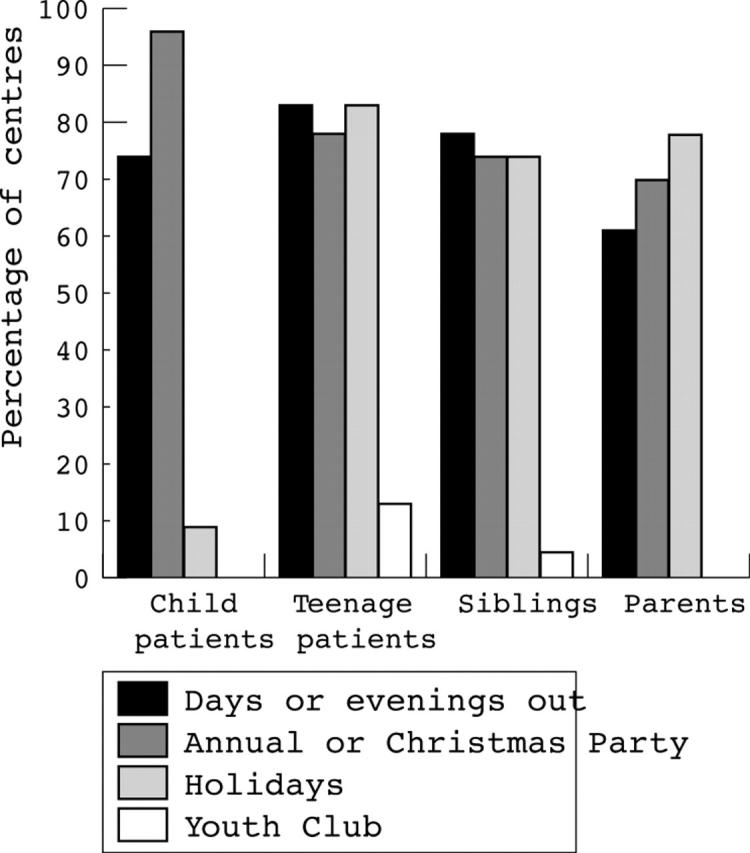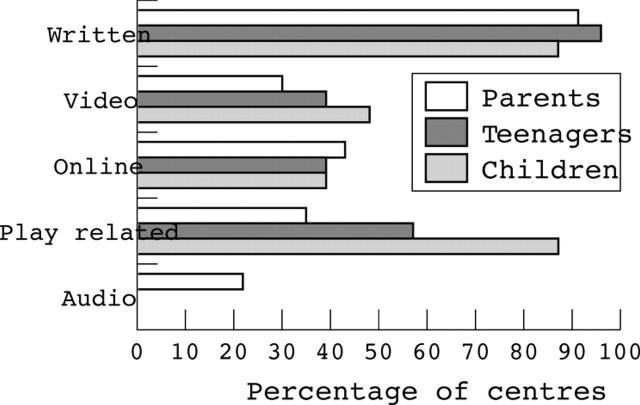Abstract
Aim: To obtain a comprehensive overview of current patterns of psychosocial support provided by National Health Service (NHS) paediatric oncology treatment centres across the UK.
Methods: A postal questionnaire was sent to co-ordinators in the UK Children's Cancer Study Group (a professional body that is responsible for the organisation of treatment and management of childhood cancer in the UK) in 21 treatment centres and three separate Teenage Cancer Trus units. A range of psychosocial topics were explored, including ratio of staff providing support to patients; facilities provided for children and families; psychosocial support services such as support groups; information provision; and transition support.
Results: There were many good areas of support provided by centres, but there was also a lack of standard practices and procedures. All centres employed social workers, play specialists, and paediatric oncology outreach nurses, but patient to staff ratios varied across centres. The poorest staff provision was among psychologists, where patient to staff ratios ranged from 132:1 to 1100:1. Written information was standard practice, while provision of other types of information (audiovisual, online) varied; none of the centres provided audio information specifically for children/young people.
Conclusion: This variability in practices among centres frequently occurred, as centres rarely had procedures formally agreed or recorded in writing. British government policy currently seeks to develop standards and guidelines of care throughout the National Health Service. This study further demonstrates the importance of standards and the need to agree guidelines for the provision of psychosocial support for children/young people and their families throughout the course of the illness.
Full Text
The Full Text of this article is available as a PDF (76.4 KB).
Figure 1.

Leisure activities.
Figure 2.
Types of information routinely made available to families.
Selected References
These references are in PubMed. This may not be the complete list of references from this article.
- Eden O. B., Black I., MacKinlay G. A., Emery A. E. Communication with parents of children with cancer. Palliat Med. 1994;8(2):105–114. doi: 10.1177/026921639400800203. [DOI] [PubMed] [Google Scholar]
- Eiser C., Hill J. J., Blacklay A. Surviving cancer; what does it mean for you? An evaluation of a clinic based intervention for survivors of childhood cancer. Psychooncology. 2000 May-Jun;9(3):214–220. doi: 10.1002/1099-1611(200005/06)9:3<214::aid-pon455>3.0.co;2-o. [DOI] [PubMed] [Google Scholar]
- Jankovic M., Van Dongen-Melman J. E., Vasilatou-Kosmidis H., Jenney M. E. Improving the quality of life for children with cancer. European School of Oncology Advisory Group. Tumori. 1999 Jul-Aug;85(4):273–279. doi: 10.1177/030089169908500412. [DOI] [PubMed] [Google Scholar]
- Mastroyannopoulou K., Stallard P., Lewis M., Lenton S. The impact of childhood non-malignant life-threatening illness on parents: gender differences and predictors of parental adjustment. J Child Psychol Psychiatry. 1997 Oct;38(7):823–829. doi: 10.1111/j.1469-7610.1997.tb01600.x. [DOI] [PubMed] [Google Scholar]
- McGrath P. Identifying support issues of parents of children with leukemia. Cancer Pract. 2001 Jul-Aug;9(4):198–205. doi: 10.1046/j.1523-5394.2001.94008.x. [DOI] [PubMed] [Google Scholar]
- Ritchie M. A. Sources of emotional support for adolescents with cancer. J Pediatr Oncol Nurs. 2001 May-Jun;18(3):105–110. doi: 10.1177/104345420101800303. [DOI] [PubMed] [Google Scholar]
- Sloper P. Needs and responses of parents following the diagnosis of childhood cancer. Child Care Health Dev. 1996 May;22(3):187–202. doi: 10.1046/j.1365-2214.1996.788788.x. [DOI] [PubMed] [Google Scholar]
- Sloper P. Predictors of distress in parents of children with cancer: a prospective study. J Pediatr Psychol. 2000 Mar;25(2):79–91. doi: 10.1093/jpepsy/25.2.79. [DOI] [PubMed] [Google Scholar]
- Soothill K., Morris S. M., Harman J. C., Francis B., Thomas C., McIllmurray M. B. Informal carers of cancer patients: what are their unmet psychosocial needs? Health Soc Care Community. 2001 Nov;9(6):464–475. doi: 10.1046/j.0966-0410.2001.00326.x. [DOI] [PubMed] [Google Scholar]
- Van Dongen-Melman J. E. Developing psychosocial aftercare for children surviving cancer and their families. Acta Oncol. 2000;39(1):23–31. doi: 10.1080/028418600430932. [DOI] [PubMed] [Google Scholar]
- Wallander J. L., Varni J. W. Effects of pediatric chronic physical disorders on child and family adjustment. J Child Psychol Psychiatry. 1998 Jan;39(1):29–46. [PubMed] [Google Scholar]
- Woodgate R. L. Social support in children with cancer: a review of the literature. J Pediatr Oncol Nurs. 1999 Oct;16(4):201–213. doi: 10.1177/104345429901600405. [DOI] [PubMed] [Google Scholar]
- Woodgate R. Part II: a critical review of qualitative research related to children's experiences with cancer. J Pediatr Oncol Nurs. 2000 Oct;17(4):207–228. doi: 10.1177/104345420001700403. [DOI] [PubMed] [Google Scholar]
- Yantzi N., Rosenberg M. W., Burke S. O., Harrison M. B. The impacts of distance to hospital on families with a child with a chronic condition. Soc Sci Med. 2001 Jun;52(12):1777–1791. doi: 10.1016/s0277-9536(00)00297-5. [DOI] [PubMed] [Google Scholar]



